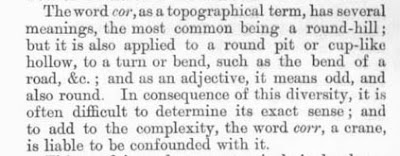Click on the Map to enlarge.
Some notes on the place-names of the Corclogh/ Ballymacoolaghan area:
- Breaninish (Bréan-Inis): Foul Island
- Muckinish (Muic Inis): Pig island (previously, 1660, incorrectly anglicised as Mackenesse Island). No doubt pigs were kept on this island many centuries ago.
- Incha na Calliagh (Inis na gCailleach): Island of (the) hags
- Inchaclea: There is no mountain here, so it can't be Inis An tSléibhe; Clea probably means Clai, a dyke or fence; hence, Island of the Dyke.
- Corclogh (An Chor Chlocach, but previously also Corr-cloch): perhaps Mound of Stones, but could also be The Unusual Stone or Rock-stone. The actual meaning would be found in the folklore, probably lost with the change-over from Irish to English in the early 19th century. See extract from Joyce below.
- Gortacallow (Gort an Chalaidh): Field of the Callow. Gort is really neither a garden nor a Field, but something in between, i.e., a cultivated plot of ground. This is a rather small townland, and Rody Killeen's was the only house here. The postal address was always considered to be Corclogh.
- Ballymacoolaghan (Baile Mhic Uallacháin): Coolaghan's Home. This was the homeland of the Coolaghan clan in centuries past.
- CarrowManagh (An Cheathrú Mheánach): The Middle Quarter (of land). A Quarter was a medieval measure of land.
The OSI maps accessed show no buildings on the islands, but there were undoubtedly people living there, perhaps in little shacks, in times past.
An island can be a lonely place for a family. The story is told of a man who lived on Muckinish with his elderly and feeble father. Needing company, he rowed over to the mainland for an evening of card-playing, despite the pleas of his father not to leave him alone. While he was enjoying his evening with his mainland neighbours, his father died. Coming to the bank of the river, he found the ghost of his judgmental father sitting in his boat before him. He got such a fright he fell into the water and drowned. This death was unexpected so he did not realise he was dead. His ghost can now be heard late at night crying out "Who will ferry the Muckinish Man?"
As to Corclogh, Joyce considers the meaning of "Cor" in place names in the following extract:
As to Corclogh, Joyce considers the meaning of "Cor" in place names in the following extract:
The islands, or part of them, were also known as "The Cribbies." We don't know what this word means, except that it turns up in several counties as applying to islands. Perhaps it refers to the marshy or dangerous nature of these river islands.
The Village and Islands are accessed from Banagher by taking the Crank Road. A strange name, it derives (as I learned from James Scully of the Offaly Historical and Archaeological Society on my recent weekend in Banagher) from the mechanical "Crank," as found in Crank-shaft and Crank-handle, devices that have two right-angled bends, as does the Crank Road leaving Banagher, (and, less significantly, as it bends around Rody Killeen's).
The Village and Islands are accessed from Banagher by taking the Crank Road. A strange name, it derives (as I learned from James Scully of the Offaly Historical and Archaeological Society on my recent weekend in Banagher) from the mechanical "Crank," as found in Crank-shaft and Crank-handle, devices that have two right-angled bends, as does the Crank Road leaving Banagher, (and, less significantly, as it bends around Rody Killeen's).
 |
| Crank-handle |


No comments:
Post a Comment